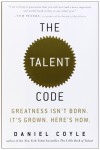 I read a fascinating book over the summer: “The Talent Code” by Daniel Coyle. Subtitle: “Greatness isn’t born, it’s grown. Here’s how.” The book takes you on a wide-ranging journey to talent “factories” like a run-down tennis gym in Russia, a run-down indoor soccer arena in Brazil, a run-down baseball field in the Dominican Republic, a storefront music studio in Texas, and shows how coaches and teachers at these unassuming places are churning out world champions in their respective disciplines.
I read a fascinating book over the summer: “The Talent Code” by Daniel Coyle. Subtitle: “Greatness isn’t born, it’s grown. Here’s how.” The book takes you on a wide-ranging journey to talent “factories” like a run-down tennis gym in Russia, a run-down indoor soccer arena in Brazil, a run-down baseball field in the Dominican Republic, a storefront music studio in Texas, and shows how coaches and teachers at these unassuming places are churning out world champions in their respective disciplines.
One chapter called “The Three Rules of Deep Practice” shows how violin students at an elite music camp in New York master challenging repertoire with lightning speed. The “secret ingredients” aren’t so mysterious and can be broken down into three steps: Chunking (including “rhythm practice” and SLOWING DOWN). Repetition. and Error Recognition (leading to self-correction). I am thankful that I’ve already built my teaching practice around emphasizing these three tools. It’s up to students to use them!
Here is a brief descriptive excerpt about this process:
“[At Meadowmount music camp] teachers take the idea of chunking to its extreme. Students scissor each measure of their sheet music into horizontal strips, which are stuffed into envelopes and pulled out in random order. They go on to break those strips into smaller fragments by altering rhythms. For instance, they will play a difficult passage in dotted rhythm. This technique forces the player to quickly link two of the notes in a series, then grants them a beat of rest before the next two-note link. The goal is always the same: to break a skill into its component pieces (circuits), memorize those pieces individually, then link them together in progressively larger groupings (new, interconnected circuits).
At Meadowmount jagged bursts of notes are stretched into whale sounds. One teacher has a rule of thumb: if a passerby can recognize the song being played, it’s not being practiced correctly. When [the camp director] teaches a class, he spends three hours covering a single page of music. New students are surprised at the seemingly glacial pace — it’s three or five times slower than they’ve ever gone. But when they’re finished, they have learned to play the page perfectly; such a feat would otherwise take them a week or two of shallower practice. … As football coach Tom Martinez likes to say, “It’s not how fast you can do it. It’s how slow you can do it correctly.”
Check out this video of the author and book subject featured on Nightline. And here’s more information on the virtue of practice time.
